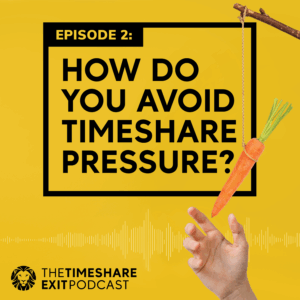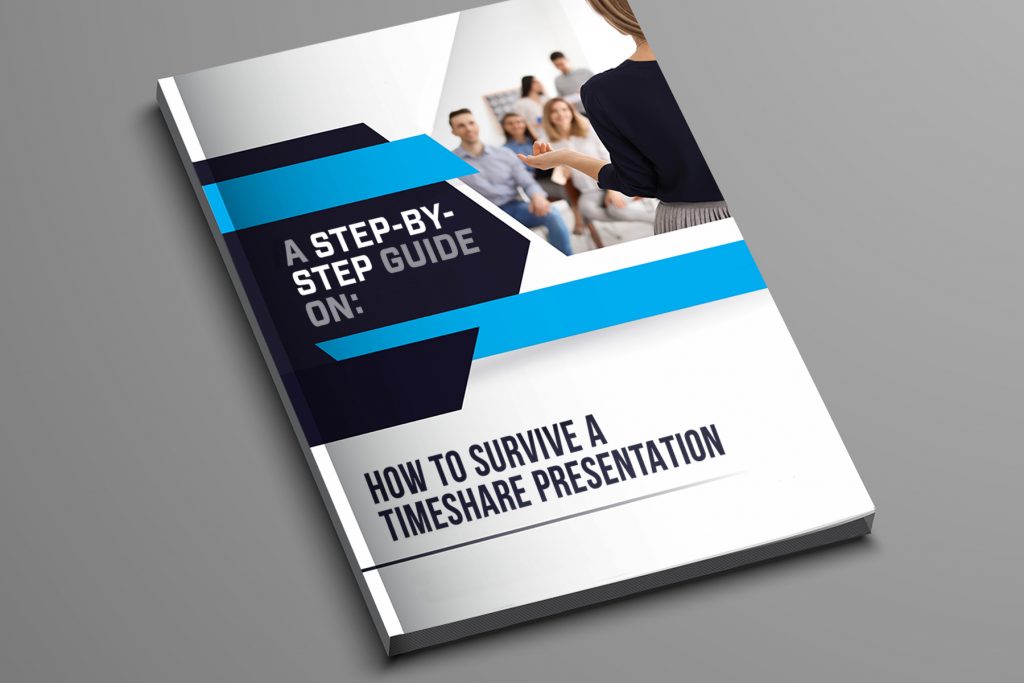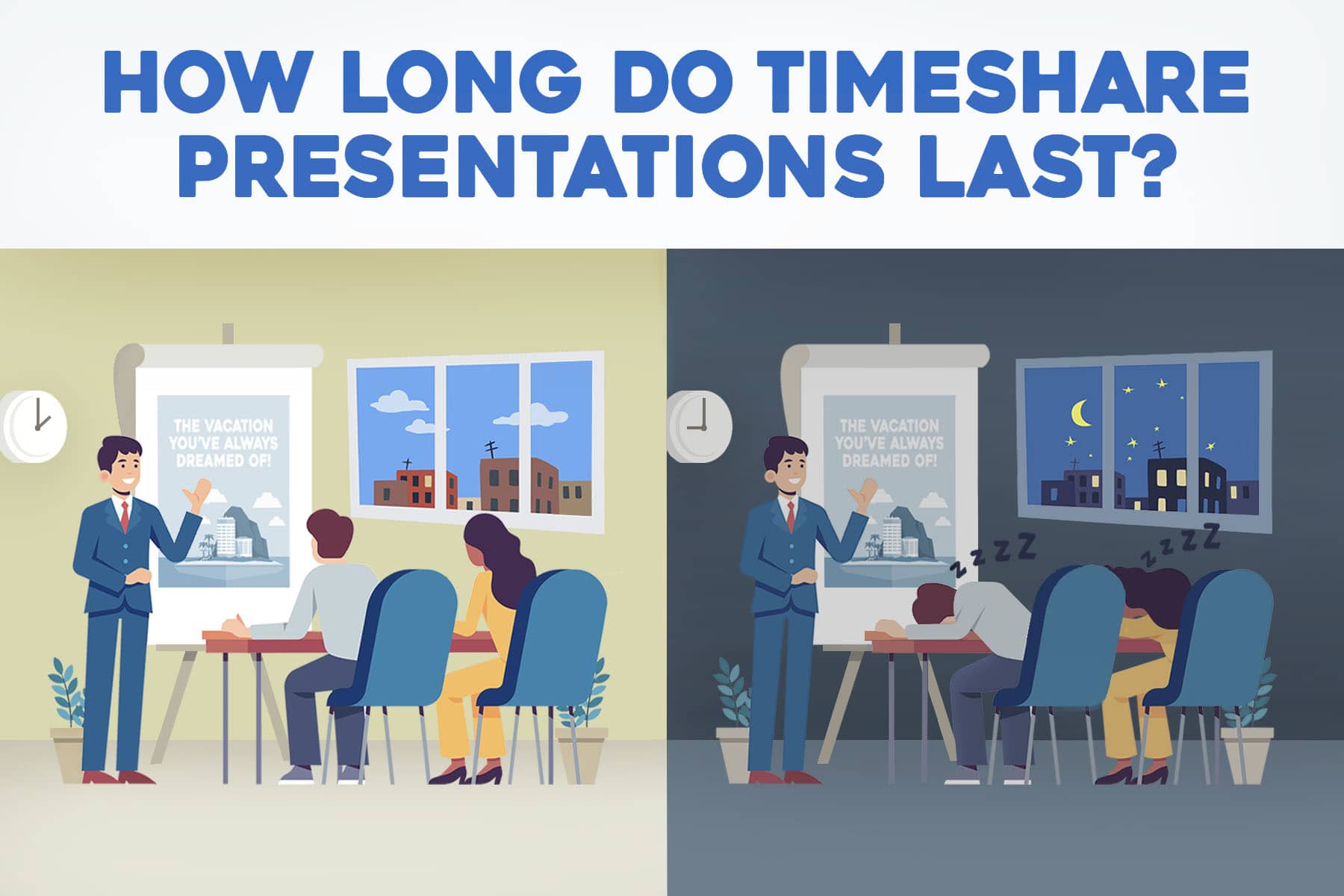
February 28, 2025 · Episode 2
12 Min, 6 Sec · By Wesley Financial Group
Ever been offered a "free" vacation in exchange for a quick presentation? Spoiler alert: it's rarely quick—and it’s almost never free. In this episode, we peel back the curtain on the high-pressure world of timeshare sales tactics. From the too-good-to-be-true deals to the relentless persuasion playbook, we walk you through how these presentations work—and how to walk away. Backed by a practical guide from Wesley Financial Group, we’ll arm you with real strategies to spot red flags, dodge the pressure, and protect your wallet. Whether you’re timeshare-curious or trying to cancel a timeshare you regret, this episode is your survival guide. Listen in and take back control of your vacation decisions.
Table of Contents
How to End a Timeshare Presentation
Some say the only way to get out of a timeshare presentation is by leaving as timeshare buyers. To the contrary! There are several ways to avoid the pressure of resort salespeople and leave the same way you entered, without the burden.
In this guide, you’ll find a step-by-step guide on surviving timeshare presentations and answers to the question that everyone has, how do you avoid timeshare pressure?
FREE
Timeshare Exit Info Kit
Get your free Timeshare Exit Info Kit today to learn more about Wesley Financial Group and how we may be able to help you get out of your timeshare.
How Timeshare Presentations Work
A timeshare presentation is nothing but a sales pitch. The number one goal of these presentations is selling timeshares. Resorts lure their guests into attending by presenting gifts and prizes like a discounted weekend stay, a cruise trip, tickets to a local event, a free meal, or whatever else they can offer. However, you must attend their 90-minute presentation to receive the gift.
Be advised that these presentations seldom end on time. Former attendees have claimed they went on for four hours. During a timeshare presentation, aggressive salespeople will use high-pressure tactics. They may use multiple salespeople to break down your defense or make misleading statements to play with your emotions. It should be evident by now that it’s a pitch.
There are two ways to get out of a timeshare presentation: buy one or just leave. While leaving sounds easy enough, the salespeople will do everything possible to prevent that.
What is a timeshare pressure sales tactic?
A timeshare pressure sales tactic is a strategy used by sales representatives to pressure potential buyers into making decisions and signing contracts on the spot. Tactics may include using high-pressure sales techniques, providing limited-time offers, or presenting false information.
What should I do if I am feeling pressured to buy a timeshare?
If you feel pressured to buy a timeshare, it is crucial to take a step back and evaluate your decision. Consumers should never feel obligated to decide on the spot and should take their time to make sure they are making an informed decision. It is also important to remember that a sales representative cannot guarantee a return on investment.
What should you do if you feel uncomfortable in a timeshare presentation?
If you feel uncomfortable in a timeshare presentation, you should consider asking for a break or leaving the presentation entirely. Bring a friend or family member for support and a second opinion if possible.
Preparing For a Timeshare Presentation
Before attending a presentation, remember that getting out is more complicated than getting in. Following are a few suggestions on how to prepare to handle the pressure of timeshare companies without making a regrettable mistake:
- Find Out If You Will Be Speaking to Timeshare Salespeople: The typical timeshare salesperson is sneaky. So, find out who you’re dealing with before taking them up on an offer. If you’re suspicious about their intentions, outright ask if they are, in fact, part of the sales team of the resort in question. Their answer should be a clear indicator of their interest.
- Research the Timeshare Company Beforehand: Sometimes, the offer seems too good to pass up, like a trip to Disneyland. If you’re tossing around the idea of attending a timeshare presentation, do research before making the trip. However, some resorts avoid mentioning the words “timeshare presentation”. They often get referred to as resort tours, vacation promotions, gift opportunities, etc. Nonetheless, always research a company that reaches out and makes grandiose gestures.
- Know the Requirements to Be Eligible for a Gift (if applicable): Many timeshare guests attend presentations as a prerequisite to receiving a gift from the resort, such as free or reduced stays, bonus points, or free excursions. However, sales representatives may use it against you to influence your decisions. Knowing how long you need to stay to be eligible for a gift is critical. Don’t get misled in the heat of the moment.
What kind of questions should you ask before making a timeshare purchase?
Before making a timeshare purchase, ask questions such as how long the purchase is binding, what the maintenance fees are, and how the timeshare can be resold or exchanged.
What are the most common examples of timeshare scams?
Common timeshare scams include bogus offers of free vacations for attending a presentation, high-pressure sales tactics, and misrepresentations of the timeshare’s value. It is vital to research and thoroughly understand the terms of the deal before signing any agreements.
How can I protect myself from timeshare pressure?
Consumers can protect themselves from timeshare pressure by educating themselves, taking their time to make decisions, and always getting everything in writing. It is important to remember that sales representatives are trying to make a sale, so it is up to the consumer to stay informed and make an informed decision.

A Step-By-Step Guide On How to Survive a Timeshare Presentation
Knowing how to avoid the pressure of timeshare vendors if you plan on attending is important. The presentations can sometimes go on for hours as they hope to wear you down into making a sale. To leave a timeshare presentation with no obligation, study this step-by-step guide!
Avoid the Timeshares Sales Pitch
The best way to avoid timeshare pressure is to bypass timeshare offers. However, the resorts make that challenging at times. You may have received such requests before. Whether it’s unsolicited phone calls announcing a free vacation or encounters with dubious sales representatives giving out tickets to a popular tourist attraction. Remember, there’s always a catch. And that catch is attending their presentation. If you have no desire to listen to a timeshare pitch, do not accept these offers.
Or, Only Stay For the Agreed-Upon Time Frame
Timeshare presentations are perhaps best known for how long they last. Sure, they say that it is 90 to 120 minutes long, but before you know it, several have passed. The best advice to prevent that from happening is to get in and get out! If you attend the presentation to meet eligibility for a gift or prize, stay for the time frame initially set. Have an alarm on your watch or phone as a reminder.
Present As Little Personal Information As Possible
Are you not planning to buy a timeshare but attending a presentation anyway? Then don’t give the timeshare sales staff your personal information. That goes for phone numbers, email addresses, physical addresses, names of family members, and whatever else they ask for that you’re uncomfortable with sharing. The salespeople will be persistent but hold your ground and don’t engage.
Do Not Disclose Bank or Credit Card Data
The last thing to share with a greedy salesperson is financial information. Under no circumstances should you provide your bank or credit card information. They may say it’s a once-in-a-lifetime deal but only available today. Don’t fall for it. There are thousands of timeshare properties, and they’re not going anywhere. Keep your finances to yourself, and if you are interested in buying a timeshare, don’t rush into it at a presentation.
Refuse to Sign Documents On the Spot
No matter what the salespeople put in front of you, don’t sign it. You are bound to uphold its terms and conditions as soon as you sign your name on a timeshare agreement. You’re better off taking the documents home to review yourself or with a trusted financial advisor.
Just Say No!
In the end, just say no. Tell the first salesperson no, tell the second salesperson no, and so on! You are by no means obligated to buy a timeshare to accept a gift offered by the resort. Nevertheless, the salespeople may still make you feel that way. If you are not interested in timeshare ownership, do not lead them on. Let them know your feelings from the beginning of the presentation.
Keep Saying No!
The timeshare industry is home to some of the most highly-trained salespeople in the world. Therefore, just saying “no” is not always enough. It’s ok if you have to get crass with the salespeople. If not, they’ll keep pushing you into a sale, so you may have to push back.
Leave If the Situation Becomes Uncomfortable
Although it may feel like it at times, you’re not locked in that room. Feel free to get up and leave if the experience becomes unbearable. But if you leave before the agreed set time (90-120 minutes), you may have to forfeit the gift promised to you for attending. A free vacation trip is tough to give up in the heat of the moment, but, in the long run, leaving will be the best decision.
Timeshare Frequently Asked Questions
What Is a Timeshare Property?
A timeshare is a vacation property under fractional ownership–meaning multiple owners share the use and expenses of one unit. Timeshares are often found in resort condominiums in high-tourist areas and are marketed as money-saving vacation homes. Whether timeshares are good or bad, they are popular within the travel industry. Yet, how do people come to buy timeshares in the first place? Well, that all transpires at the sales presentations.
How Much Does a Timeshare Cost?
The expenses are divided among the shared owners. The costs associated with a timeshare can be separated into that paid upfront (e.g., a deposit) and those paid ongoing (e.g., mortgage and maintenance fees).
According to the American Resort Development Association, the average price of a timeshare interval in 2022 is $24,140, though some resorts charge more. In addition, the annual maintenance fee will average more than $1,000. Although many resorts will market these expenses as great deals, these so-called savings are often only temporary.
Can I Cancel a Timeshare Purchase?
Timeshare agreements are subject to the rescission laws of the state in which they are purchased. Most states only provide a brief cooling-off period of three to fourteen days. Once that time has passed, exit options become limited and risky. However, some aggrieved owners may find relief in the resale market or by hiring a timeshare cancellation company.
What are some red flags to look out for when buying a timeshare?
Some red flags to look out for when buying a timeshare include offers that seem too good to be true, high-pressure sales tactics, and sales representatives who try to pressure you into signing but cannot provide proof of a return on investment.
Before purchasing a timeshare, it is crucial to consider the length of the agreement, the fees associated with it, the terms and conditions of the deal, and the availability of the timeshare.
Are there any legal protections I should be aware of before buying a timeshare?
Yes, knowing any legal protections is important before signing a timeshare agreement. Consumers should research all state and federal laws related to timeshares, as well as the Consumer Bill of Rights and the Fair Debt Collection Practices Act. Additionally, asking questions and seeking legal advice before signing a timeshare agreement is critical.

What If You Buy a Timeshare and Regret It?
Not everyone can avoid the pressure of a timeshare presentation. That’s no fault of yours, but instead at the hands of the greedy salespeople. However, it is up to you to resolve it. If you’re proactive, getting out of the timeshare agreement shouldn’t be an issue.
What you need is to rescind the timeshare purchase. Doing so will make it as if the sale had never happened, and you’ll receive a full refund. The only catch is that you have less than two weeks from the purchase date. Find out more about timeshare rescission and the related state laws here.
So what happens if you miss that window of opportunity? The options become limited and are less favorable from a financial standpoint. You might have to give up on recouping what you paid and, instead, focus on stopping further timeshare expenses. Here’s what the options are:
- Ask the Resort to Take It Back
- List it in the Timeshare Resale Market
- Hire a Timeshare Cancellation Company
What should I do if I feel like a timeshare representative has misled me?
If you feel like a timeshare representative has misled you, it is essential to contact the state attorney general’s office or the Federal Trade Commission. Consumers should also report any fraudulent or deceptive practices to the Better Business Bureau.
Wesley Financial Group, LLC*
Wesley Financial Group, LLC (WFG)* is a perfect example of a timeshare cancellation company. Founded in 2011 by a pioneer of the timeshare cancellation industry, Chuck McDowell, WFG has since canceled tens of thousands of timeshares. WFG specializes in timeshare termination for owners who are victims of fraudulent activity by salespeople.
If you were lied to or misled into buying your timeshare, then WFG may be able to help. Schedule a free consultation to learn more!

Over 50,000 families helped!
Find out if you can cancel your timeshare. Schedule a FREE consultation with timeshare cancellation experts now.
Get Rid of Your Timeshare
Schedule a FREE Consultation with one of our timeshare cancellation experts who have saved families over $635 million.










